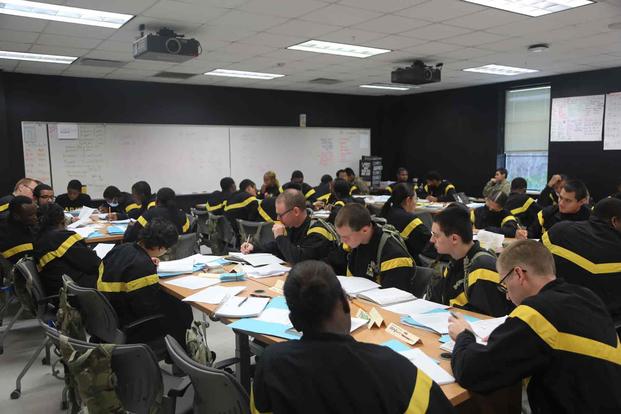The Army is expanding its pre-basic training course this month so that soldiers who fall below the service's physical fitness and academic standards can try to clear both hurdles at once -- rather than choosing one or the other track -- before entering boot camp.
And a new Army pilot program that is part of the so-called Future Soldier Preparatory Course, or FSPC, will also provide the pre-boot camp help to a small number of candidates whose entrance test scores fall below even the substandard scores required of others in the course.
The pre-basic course is designed to help recruits who are physically out of shape or have trouble taking tests -- and to get new soldiers into the Army as the service struggles with a historic recruiting slump. Until now, recruits could attend fitness or academic pre-basic training programs.
Read Next: 2023 Ain't 2022: More Americans Signing Up with Army Guard, Internal Docs Show
After several months of experience with the pilot program, and a success rate well over 90%, leadership is tweaking it to get more out of the pre-training by offering the two combined programs to prospective recruits. That means help getting into shape and scoring well on the Armed Services Vocational Aptitude Battery, or ASVAB.
"The graduation rate for both tracks is greater than 95%," Lt. Col. Randy Ready, a spokesperson for the U.S. Army Center for Initial Military Training, said in an email statement to Military.com. "From August 2022 to early May 2023, more than 8,500 students have attended or are currently attending the course, of which 6,188 students have already graduated and shipped to basic combat training."
Meanwhile, an adjustment to the academic portion of the FSPC has expanded eligibility to nearly all prospective recruits.
When the pre-basic training course was established in August, it was open to recruits with an ASVAB score between 21 and 30. An expansion to Fort Moore, Georgia, in January opened it to recruits with scores between 31 and 49. Now, a small pilot program that is capped at 100 has been started for recruits with ASVAB scores between 16 and 20.
"The recruits in the limited pilot are not eligible for Dual Enrollment," an Army official with the Office of the Assistant Secretary of the Army, Manpower and Reserve Affairs, wrote in an email to Military.com. "They will only participate in the Academic Track of the FSPC."
It's an urgent problem encountered by military recruiters: trainees who have trouble meeting body fat standards, and those scoring low on the Army's job placement test.
The pool of civilians available for recruiting has shrunk to the lowest levels in years. The lack of qualified civilians has hurt recruiting, and Army leaders worry that it will affect readiness at a dangerous and chaotic moment in history.
Recruitment is "a critical readiness priority for us right now. We are challenged by the fact that a small number of young Americans, 23%, are qualified to serve," Gen. Randy George, vice chief of staff of the Army, said during testimony at a House Armed Services subcommittee meeting in April.
The FSPC was designed to alleviate two big stumbling blocks to joining the military: body fat requirements and low scores on the ASVAB, a test that gauges recruits' suitability for various jobs. By expanding the pool of people who could become pre-recruits and locking them into a training pipeline, the Army hopes to put more than 10,000 potential people per year in uniform.
Furthermore, it hopes to do so in a way that allows recruiters flexibility in matching recruits with interesting employment.
Recruits who have trouble with weight can focus on developing their fitness level. They have a discrete amount of time to reduce their body fat percent to within 2% of the required standard, after which they are sent to basic training.
Recruits who have trouble achieving a satisfactory score on the ASVAB go into a program focused on the basic academic skills needed to perform adequately on the test. Those who test lower than they would like are also offered an opportunity to go through the course. Upon finishing, they are offered an opportunity to renegotiate their contract, having qualified for other jobs.
While the FSPC promises substantial improvements to the recruiting pipeline and force generation, it doesn't solve a bigger dilemma facing the Army: how to grapple with cultural shifts.
The number of eligible prospective soldiers has been falling for more than a decade. About 71% of Americans were assessed as ineligible for service in 2017, and a Pentagon study in September found that 77% of young people would not qualify for military service without a waiver due to being overweight.
The decrease from already troubling numbers between 2017 and 2022 has been attributed partly to the pandemic -- when many young adults were not able to play team sports. Also, the end of the war in Afghanistan in 2021 played a role, reducing the perception among eligible young civilians that there was any urgent need to join, as there wouldn't be any fighting.
Experts have described this situation as a threat to the all-volunteer military.
Leaders hope that optimizing FSPC will help the Army achieve its recruiting goals, though time will tell whether it can produce enough soldiers to offset the problem of finding fit recruits.
"The secretary of the Army and the chief of staff of the Army have been clear that we are not going to trade quality for quantity," Ready said. "The basic standards for becoming a new soldier have not changed; rather, this program helps [provide] those young men and women who are struggling to meet the Army accession standard the help they need to overcome their personal challenge."
-- Steve Beynon contributed reporting.
-- Adrian Bonenberger, an Army veteran and graduate of the Columbia University Graduate School of Journalism, reports for Military.com. He can be reached at adrian.bonenberger@monster.com.
Related: Army Expanding Pre-Boot Camp Course for Overweight and Low-Scoring Applicants











